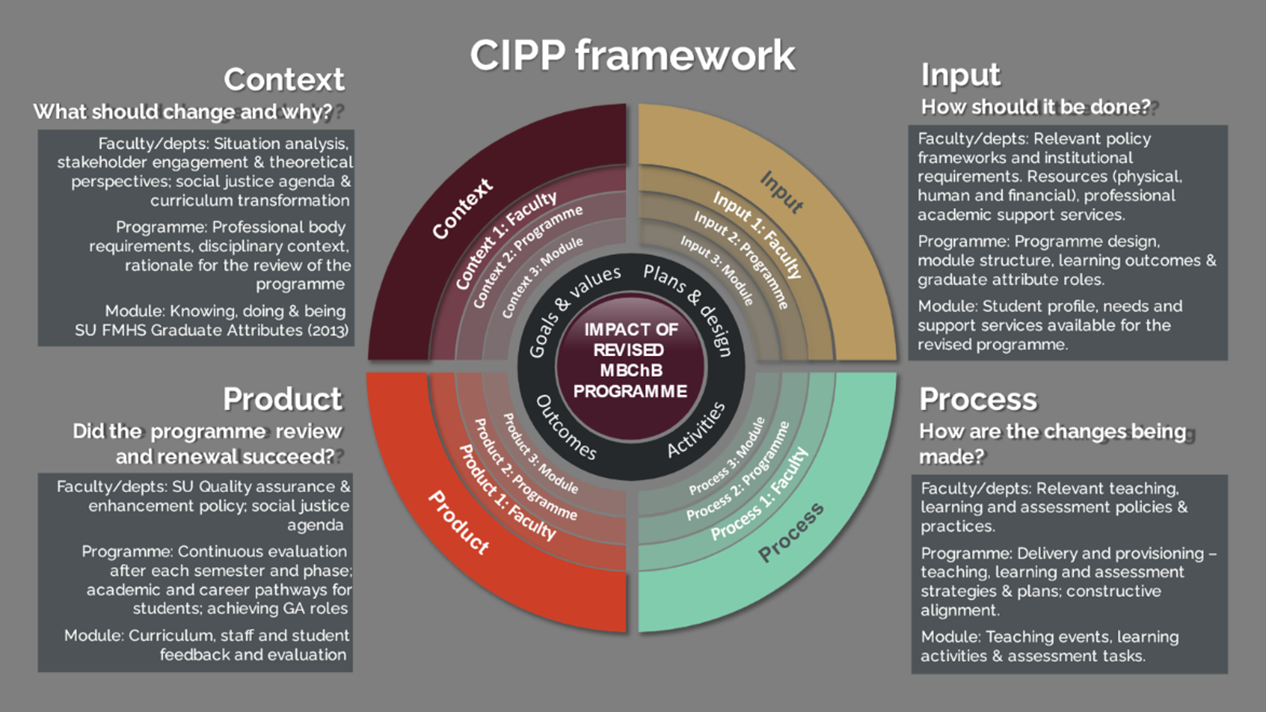
Keeping our finger on the pulse of the renewed MBChB
In 2022, Stellenbosch University (SU) introduced a renewed MBChB curriculum (see figure 1), as part of an institution-wide programme renewal process which is aligned with national and global drivers for change.
“Curriculum reform is a complex and lengthy process. Research and monitoring and evaluation (M&E) are key components of the reform to ascertain the extent to which the targeted educational needs are met," explains Prof Karin Baatjes, Vice Dean: Learning and Teaching for SU's Faculty of Medicine and Health Sciences (FMHS). The assessment of the programme forms part of the existing quality enhancement culture within the FMHS that will shape ongoing and iterative renewal processes across all curriculum renewal activities, she continues.
Figure 1: Depiction of the renewed MBChB programme
Under Baatjes's leadership a diverse and dynamic FMHS working group convened in August 2022, and was tasked with the evaluation of the renewed MBChB curriculum to ensure that it meets the high standards it set out to achieve. The overarching purpose of the working group is to review and evaluate the renewed MBChB programme, to confirm that graduates of the programme are “knowledgeable, competent, relevant, socially accountable health care providers capable of confidently and collaboratively promoting health and addressing the country's burden of disease across the continuum of health care in the context of quality universal health coverage" (ASSAf 2018).
The working group members are divided into task teams, which include project, framework, research as well as M&E teams.
The Evaluation Framework
The Framework Team assessed a number of evaluation models and adopted an adapted version of Stufflebeam's Context, Input, Process, and Product (CIPP) framework for programme evaluation (see Figure 2 which clarifies the adaptations). “Although the comparative analysis of different evaluation models revealed that the CIPP model is best suited, the project team also realised that a synergy exists between the four quadrants of the CIPP model and the four stages of a continuous improvement cycle consisting of review, re-design, renewal and evaluation, which will take place at all levels of the programme," explains Marianne Bester, Advisor for Programme Review at the Centre for Academic Planning and Quality Assurance at SU.

Monitoring and Evaluation
The M&E Team is responsible for determining indicators and evaluative questions. It employs a variety of tools such as student feedback surveys, faculty reviews, and performance metrics to gauge the curriculum's effectiveness.
“An evidence-based approach guarantees an objective evaluation of the curriculum's strengths and weaknesses, facilitates the implementation of proposed changes, and allows for the enhancement of existing strengths," says Dr Steve Jacobs, coordinator of site facilitators in the Division of Family Medicine and Primary Care, and member of the M&E Team. The team has expressed that this iterative process of monitoring, evaluation, and revision ensures that the curriculum stays relevant, effective, and aligned with the aims and objectives of the curriculum renewal process. Whilst in the implementation phase and until the full programme has been rolled out, our evaluation remains formative.
Evaluation Research
A scholarly approach has been adopted to improve practices and contribute to a gap in health professions education literature, whilst evaluating and enhancing the faculty's academic programmes. “This provides the opportunity to explore gaps in the existing knowledge, develop new approaches and contribute to scholarly discourse," says Dr Natasha Fourie, Division Paediatric surgery, member of the research team. This collaborative approach creates opportunities for staff and postgraduate students to research a variety of aspects associated with enhancing the quality teaching, learning and assessment opportunities of the revised MBChB programme.
Thus, the research initiative is dual-faceted, encompassing both the evaluation research team's evaluation of the programme and the broader investigation mentioned above.
Conclusion
“During the implementation phase, the working group is engaged in a formative evaluation with a sustained focus on the reality of the global, national, institutional, and faculty drivers of programme renewal. These factors guide the institutional pursuit of shaping a medical graduate ready to enter internship and professional working life," says Baatjes.
“Evaluating this renewal is a new and challenging venture we are excited to pursue as a faculty. Our aim is to enhance teaching, learning, and assessment across the entire faculty, ultimately producing future health professionals who bring significant value to society in the South African context," Baatjes concludes.
